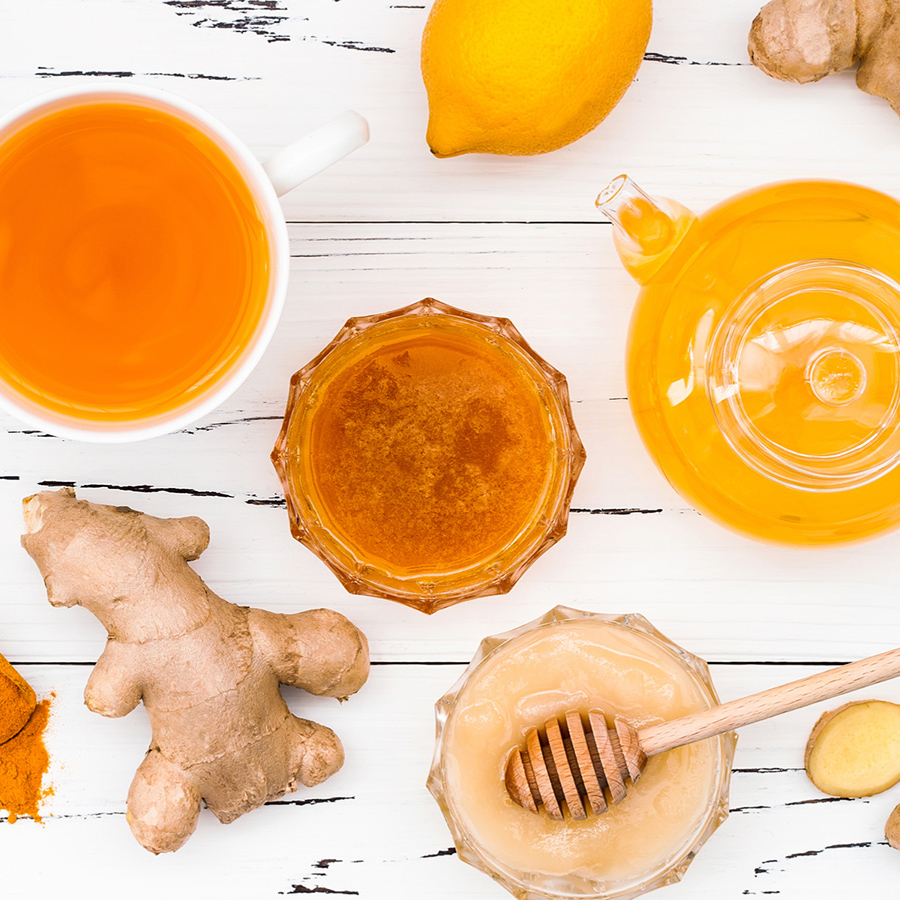By Dr Sarah Lantz
Recipe from Forage, Ferment, Feast by Sarah Lantz & Weier Higgs.
I Wanna Jamu With You
This recipe, Jamu (the old spelling is Djamu), is a delicious, warming, traditional plant medicine tonic originating from Indonesia. Its linage can be traced back to the royalty of Java, similar to the way that Ayurveda’s linage can be traced to India. Jamu is considered a potent herbal tonic or infusion made from roots, bark, flowers, seeds, leaves and fruits and used as a remedy to purify, energise, heal and, locals say, beautify the body.
In most places across Indonesia, Jamu herbal tonic is still sold at street-side stalls by hawkers carrying the yellow and orange tonics, often sweetened with honey or coconut sugar. This is where we originally got acquainted with this tonic – in a little shop surrounded by rice paddy fields, gaggles of ducks and diligent farmers pulling muddy oxen hitched to wooden ploughs. In Indonesia, Jamu is known locally as Jamu Kunyit Assem, and one is encouraged to drink the tonic neat upon rising to wake up the senses, on the rocks with a squeeze of lemon to restore natural energy throughout the day, or warmed for a gentle, restorative cup of golden tea. A Balinese high priest once told me that women traditionally drink Jamu two or three times a week for beauty, while men drink it mixed with raw egg yolk for strength and sexual virility. With all the beautiful, barefoot children running around the villages, it’s clear that Jamu continues its potency.
Inspired by this traditional food wisdom, this Jamu tonic recipe is a carefully crafted infusion that blends old world practices with pure local tastes. While many forms of Jamu beverages are created and consumed raw, this recipe is heated. Like many in the health industry, and generally in Ayurvedic traditions, our Javanese teachers believed that drinking too much raw turmeric root was not good for the pancreas or liver, while heating the turmeric during cooking helped to increase the amount of curcumin that the body can absorb. There is hardly a system in the body that isn’t supported by the powerful antioxidant qualities of turmeric, including the blood, liver, joints, immune system and digestive tract. To boost the turmeric’s potency, a touch of black pepper is added. Black pepper contains an alkaloid called piperine, which helps curcumin better absorb into the body. Combined with nature’s other superheroes – tamarind, lemon and a touch of pure local honey or a sweetener of your choice – this recipe yields a potent, powerful and delicious tonic, both on the rocks or warmed as a restorative tea.
MAKES A 2 LITRE BREW
Ingredients
- 5 inch piece of turmeric root, peeled and cut into pieces
- 5-7 tamarind pods or 2 tablespoons tamarind paste or concentrate
- 1⁄2 cup raw honey or coconut sugar (or sweeten to taste)
- 2 litres of water
- A pinch of black pepper
- Juice of 1⁄2 lemon (optional)
Method:
Slice the turmeric root and prepare the tamarind pods.
Crack and open the pods and remove only the fruit. Place both into a blender along with a pinch of black pepper and some of the water. Blend at high speed for a few minutes, then pour the yellow mixture into a pot with the remaining water and slowly bring to a gentle simmer for ten minutes.
The water will become a rich golden yellow or orange. Then add the honey or coconut sugar and stir until dissolved, then lemon juice to taste.
The Jamu can now be strained and consumed as a soothing, restorative tea, or it can be cooled and poured into glass jars or bottles with tight lids, leaving half to one inch of head space.
Brewing tips
Bear in mind that fresh turmeric stains everything it comes into contact with, so don’t use your best chopping board, and gloves can be worn if you are making large batches. It’s also a good idea to wash your blender immediately and thoroughly after using.
You can also bottle and ferment your Jamu at room temperature for 1–2 days, then refrigerate for storage. The honey will gradually ferment, leaving the taste but not the sweetness.
Change up the recipe with a thumb of ginger or galangal for an extra kick or try any combination of cider spices such as cloves, nutmeg and cinnamon.
Article by:
Dr Sarah Lantz (PhD)
Buchi Brew Co. & Sacred Women’s Way
Want more recipes like this? Sign up to Bud Organic Club for free here and get them delivered straight to your inbox!


